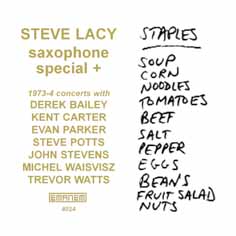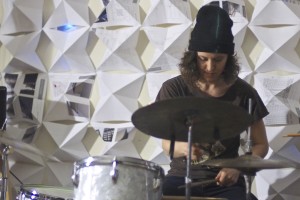Mostly Other People Do the Killing — Mauch Chunk (Hot Cup, 2015)
 Now that Mostly Other People Do the Killing has a pianist, I’m glad to see that he’s not just there to play the role of the straight man. But I’m also glad he’s not there to plunge into 100% free jazz.
Now that Mostly Other People Do the Killing has a pianist, I’m glad to see that he’s not just there to play the role of the straight man. But I’m also glad he’s not there to plunge into 100% free jazz.
For 12 years, MOPDTK has mixed swing and bebop with smart-alecky, off-the-rails playing. Bassist and bandleader Moppa Elliott has found a formula that injects humor and way-outside soloing into straight-laced compositions.
For Mauch Chunk, the band’s eighth album, trumpeter Peter Evans is gone, with pianist Ron Stabinsky filling the void. The addition of a chord instrument, and one with so much potential to be cheesy and loungy, means a noticeable change of sound, so I was very curious to hear this album. We technically heard Stabinksy on the band’s previous studio album, Blue — the Kind of Blue replica — but how much of that was him, really? (That’s part of the debate.)
Left with one horn soloist, MOPDTK could settle into a formula: Jon Irabagon gets all nutty on sax while the piano maintains the swing and the chords. And that’s how the opening track, “Mauch Chunk is Jim Thorpe,” starts out, with Stabinsky laying down a straight jazz-club sound behind the theme, played in attitude-laden curls by Irabagon. And Stabinsky continues with straight comping while Irabagon’s solo increasingly warbles further and further off the rails.
But eventually, Stabinsky joins in, too. It’s around the time Irabagon pulls out a “happy as a kitten up a tree” quote that you notice Stabinsky has gone into a frenzied pounding. The pianist is in on the joke, too.
Something similar happens on “Obelisk.” Listen as Stabinsky and Elliott hold the center while Irabagon and drummer Kevin Shea surf the astral plane. It’s followed by a new phase where the piano goes into staccato jackhammering mode.
But often, the piano is a jazz anchor for the band’s wanderings, and that’s a good thing. MOPDTK isn’t just about free jazz and crazy solos; its foundation is a deep knowledge of the past and the application of old ideas in new settings. So when Stabinsky goes through a long stretch of straight chording, that’s all right. It fits, and the band is richer for it.
Irabagon is great, as ever, his bebop-gone-mad solos packed with hard-fought surprises. He doesn’t just play the tune; he plays the whole attitude of the band. Elliott on bass and Shea on drums stoke the fire, pushing the mostly hard tempos of Elliott’s smart, snappy compositions.
The band in a nutshell can be experienced on “Townville.” It goes zero-to-sixty right away, the band members pushing one another hard. But the bright-burning solos are followed by an avant-garde intrusion: Irabagon reduces down to whispers and subliminal moans on sax, behind some perky free playing from the rest of the band. Then they pull back into hard-swing mode. It’s a workout.
As usual, the songs are named after obscure Pennsylvania towns — with the caveat that Mauch Chunk is now named Jim Thorpe, as the song title says. There’s a poignant story behind that, which I leave you to discover in Elliott’s CD notes.
Here’s “Mauch Chunk Is Jim Thorpe.”




